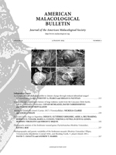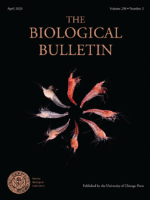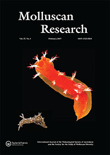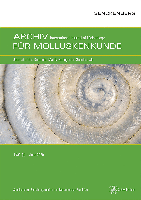
AMERICAN MALACOLOGICAL BULLETIN
Scope & Guideline
Bridging Research and Conservation in Malacology.
Introduction
Aims and Scopes
- Molluscan Ecology and Distribution:
Research on the ecological aspects, distribution patterns, and population dynamics of mollusks in various environments, including freshwater and marine ecosystems. - Biodiversity and Conservation:
Studies aimed at documenting biodiversity within molluscan taxa and addressing conservation issues, particularly concerning threatened or invasive species. - Physiological and Behavioral Studies:
Investigations into the physiological responses and behaviors of mollusks, including feeding habits, reproductive strategies, and adaptations to environmental changes. - Molecular and Genetic Research:
Utilization of molecular techniques to explore genetic diversity, evolutionary relationships, and phylogenetics among molluscan species. - Historical and Paleontological Insights:
Research that incorporates historical data, including museum specimens, to understand the evolution and historical distribution of mollusks.
Trending and Emerging
- Freshwater Mollusks Research:
An increasing number of studies focus on freshwater mollusks, particularly their distribution, population dynamics, and conservation status, highlighting their ecological significance and the threats they face. - Gender Studies in Malacology:
Emerging themes around gender representation and roles within malacological research indicate a growing interest in the socio-cultural dimensions of science, as seen in studies addressing gender disparities in molluscan eponyms. - Applications of Molecular Techniques:
There is a rising trend in the use of molecular tools, such as DNA barcoding, to resolve taxonomic uncertainties and enhance understanding of genetic diversity, reflecting a broader shift towards molecular biology in the field. - Behavioral Ecology and Adaptations:
Recent publications have increasingly focused on the behavioral aspects of mollusks, including their responses to environmental cues and adaptations, which are crucial for understanding their survival and ecological roles. - Climate Change Impact Studies:
Research addressing the impacts of climate change on molluscan populations and ecosystems is gaining traction, underscoring the urgency of understanding how these organisms will respond to environmental changes.
Declining or Waning
- Invasive Species Impact Studies:
While still relevant, the frequency of studies specifically examining the ecological impacts of invasive molluscan species appears to be decreasing, possibly due to a saturation of knowledge or a shift towards more proactive conservation approaches. - Traditional Taxonomy and Systematics:
There seems to be a waning emphasis on purely traditional taxonomic studies as researchers increasingly incorporate molecular techniques and genetic analysis, which may overshadow classical taxonomy. - General Molluscan Physiology:
Broad studies on molluscan physiology without specific applications or ecological relevance have become less prominent, indicating a preference for more targeted research with direct implications for conservation or environmental management.
Similar Journals

NAUTILUS
Illuminating the Complexities of Aquatic LifeNAUTILUS is a distinguished journal published by the Bailey-Matthews Shell Museum, dedicated to advancing the understanding of aquatic sciences as well as ecology, evolution, behavior, and systematics. With an ISSN of 0028-1344, NAUTILUS has played a significant role in the scholarly community from its inception, with publication converged between 1996 to 2015 and 2017 to 2024. Although currently categorized as Q4 in Aquatic Science and Ecology, Evolution, Behavior and Systematics for 2023, the journal has a reputation for publishing high-quality research that contributes to the broader scientific discourse. Researchers and students alike can benefit from the insights provided by NAUTILUS, which remains committed to exploring the intricate relationships within aquatic ecosystems. Its editorial management, led by Dr. José H. Leal, ensures rigorous peer review and academic excellence, making it a crucial resource for those dedicated to discovering the complexities of aquatic and ecological research.

Marine Biodiversity
Advancing Knowledge in Aquatic EcosystemsMarine Biodiversity, published by SPRINGER HEIDELBERG, stands as a pivotal journal in the fields of Aquatic Science, Ecology, Evolution, Behavior and Systematics, and Oceanography. Established in 2009, it has gained a prominent place in academic discourse, evidenced by its Q2 ranking across multiple categories in the latest 2023 assessments. The journal operates out of Germany, specifically from its Heidelberg address, and caters to an international audience with a keen interest in the vast and complex dynamics of marine ecosystems. With an ongoing convergence of research outputs until 2024, Marine Biodiversity encourages contributions that expand our comprehension of marine life and its conservation, positioning itself as a vital resource for researchers, professionals, and students alike. Although currently not an open access journal, it maintains a robust reputation backed by its favorable Scopus ranks, which indicate its significant contribution to the respective fields. By disseminating high-quality, peer-reviewed articles, Marine Biodiversity plays an essential role in promoting scholarly communication and advancement in marine science.

BIOLOGICAL BULLETIN
Connecting scholars with cutting-edge biological insights.BIOLOGICAL BULLETIN is a premier journal published by The University of Chicago Press, catering to the vibrant field of Agricultural and Biological Sciences. Established in 1945, this long-standing publication has evolved to serve as a critical platform for disseminating cutting-edge research and insights across various biological disciplines. With a commendable impact factor and ranking in the top quartile (Q1) of its category, the journal is recognized for its rigorous peer-review process and its commitment to high-quality scholarship, ranking #74 out of 221 in the Agricultural and Biological Sciences category on Scopus. Researchers, professionals, and students will find a valuable resource in BIOLOGICAL BULLETIN, as it continually fosters scientific dialogue and innovation, ensuring the advancement of knowledge in the biological sciences. Although not openly accessible, the journal provides numerous access options for institutions and individuals wishing to engage with its content.

Russian Journal of Biological Invasions
Exploring the impact of invasions on ecosystems.Russian Journal of Biological Invasions, published by PLEIADES PUBLISHING INC, is a pioneering periodical dedicated to advancing the understanding of biological invasions in diverse ecological contexts. With an ISSN of 2075-1117 and an E-ISSN of 2075-1125, the journal primarily serves the scientific community in the fields of ecology, evolution, behavior, and systematics, boasting a respectable Q3 categorization in Ecology for 2023 and ranking 559 out of 721 in its domain in Scopus. The journal's coverage spans from 2010 to 2024, addressing critical issues such as the ecological impacts of invasive species and offering insights into management strategies. Though not an Open Access journal, it provides invaluable resources for researchers, professionals, and students keen on tackling the challenges posed by biological invasions. Its contributions significantly enrich the discourse in ecological research and conservation efforts, making it an essential resource for those seeking to comprehend and mitigate the effects of invasive species on ecosystems across the globe.

BULLETIN OF MARINE SCIENCE
Navigating the frontiers of marine research.BULLETIN OF MARINE SCIENCE, published by Rosenstiel School of Marine and Atmospheric Science, is a prominent journal dedicated to advancing the field of marine science through scholarly research and peer-reviewed articles. With an ISSN of 0007-4977 and an E-ISSN of 1553-6955, this journal has been contributing to significant scientific discourse since its inception in 1973. Covering a wide spectrum of topics in aquatic sciences and oceanography, it has maintained a respectable position in the academic community, as evidenced by its Q3 ranking in both categories for 2023. Although currently not an open-access journal, it provides essential access to groundbreaking research that informs marine conservation, ecological studies, and atmospheric sciences. Situated in the United States at 4600 Rickenbacker Causeway, Miami, FL 33149, the journal serves as a vital resource for researchers, professionals, and students seeking to engage with the latest findings in marine science and foster a deeper understanding of our oceans.

MOLLUSCAN RESEARCH
Exploring the Depths of Molluscan DiversityMolluscan Research is a distinguished journal dedicated to advancing the field of molluscan science, covering a broad spectrum of topics including taxonomy, ecology, evolutionary biology, and conservation. Published by Taylor & Francis Ltd, this journal has been a crucial resource for researchers from its inception in 1987 up to 2024, significantly contributing to the understanding of molluscan species and their roles in various ecosystems. With an impressive impact factor and recognized within the Q3 quartile rankings in Animal Science and Zoology and Ecology, Evolution, Behavior and Systematics, as well as Q4 in Genetics, Molluscan Research serves as a vital platform for dissemination of high-quality original research and reviews. While it does not currently offer Open Access options, the journal remains accessible through institutional subscriptions, fostering collaboration and knowledge-sharing among researchers, professionals, and students across the globe.

CYBIUM
Charting new waters in animal science and evolutionary studies.CYBIUM is a reputable journal published by the Société Française d'Ichtyologie, dedicated to advancing research within the fields of Animal Science and Zoology as well as Ecology, Evolution, Behavior and Systematics. With a commitment to fostering scientific dialogue, CYBIUM has been a valuable resource for scholars since its inception in 1996, reporting on a wide array of ichthyological studies and aquatic biology. The journal is recognized in the 2023 Scopus rankings with a notable position in the Q3 quartile for Animal Science and Zoology and Q4 for Ecology, Evolution, Behavior and Systematics, reflecting its growing influence in these disciplines. Although currently not categorized as Open Access, CYBIUM continues to provide essential insights into fish biology and ecology from the heart of France, the Museum national d'Histoire naturelle in Paris. Researchers, professionals, and students in related fields will find CYBIUM an indispensable tool for staying informed about the latest developments and research trends within ichthyology and marine sciences.

REVISTA DE BIOLOGIA MARINA Y OCEANOGRAFIA
Empowering Marine Science Through ResearchREVISTA DE BIOLOGIA MARINA Y OCEANOGRAFIA is a prominent academic journal dedicated to the fields of marine biology and oceanography, published by the Faculty of Marine Sciences and Natural Resources at Universidad de Valparaíso, Chile. Since its inception in 1996, this journal has been a vital platform for disseminating research findings and advancements in aquatic sciences, covering a breadth of topics relevant to the marine environment. With its current impact positioned within the Q4 quartile of both Aquatic Science and Oceanography categories in 2023, the journal serves as an essential resource for scholars, practitioners, and students alike, aiming to enhance their understanding of marine ecosystems. While the journal does not provide open access options, it continues to contribute valuable insights, helping to foster a deeper appreciation for oceanographic science and marine biodiversity. Located in the scenic city of Viña del Mar, Chile, this publication invites manuscripts that push the boundaries of knowledge and stimulate discourse within the marine sciences community, thereby promoting sustainable management and conservation of oceanic resources.

ARCHIV FUR MOLLUSKENKUNDE
Pioneering Insights in Mollusk ResearchARCHIV FUR MOLLUSKENKUNDE, published by E SCHWEIZERBARTSCHE VERLAGSBUCHHANDLUNG, is a premier journal dedicated to the study of mollusks, covering a broad spectrum of topics from taxonomy and ecology to conservation and biodiversity. With its commitment to advancing knowledge and fostering collaboration within the malacological community, this journal serves as an essential resource for researchers, professionals, and students alike. Though it is not currently operated under an open-access model, it provides valuable insights and the latest findings in the field, making it indispensable for those involved in mollusk research. Scholars can access the journal's rich repository of articles, ensuring their work remains at the forefront of scientific inquiry. The journal operates out of Stuttgart, Germany, further emphasizing its European scholarly tradition in the environmental and biological sciences.

Tropical Life Sciences Research
Connecting Researchers to Tropical Life Sciences InsightsTropical Life Sciences Research, published by PENERBIT UNIVERSITI SAINS MALAYSIA, is an esteemed open-access journal dedicated to the realms of Agricultural and Biological Sciences, Biochemistry, Genetics, and Molecular Biology, and Medicine. Since its inception in 2006, this journal has established itself as a significant platform for disseminating high-quality research findings that contribute to the understanding of tropical biodiversity and health-related issues. With its innovative approach, Tropical Life Sciences Research has garnered an impressive impact factor, reflecting its influence in the academic community; it is ranked Q2 in Agricultural and Biological Sciences and Q3 in both Biochemistry and Medicine categories as of 2023. Researchers and professionals can access a wealth of knowledge through this journal, whose content spans from 2009 to 2024, making it a vital resource for students and experts alike interested in advancing the science of tropical ecosystems and health. The journal also stands out for its comprehensive Scopus rankings, indicating its relevance and quality in the competitive academic landscape.